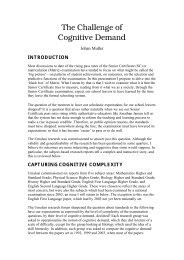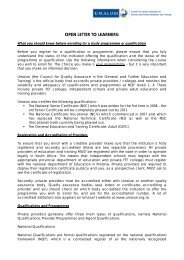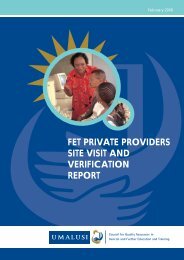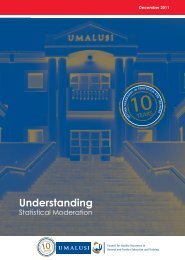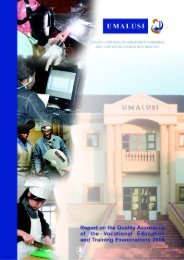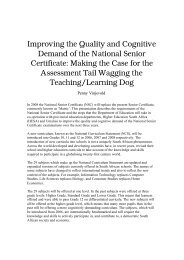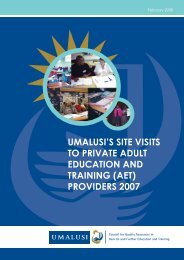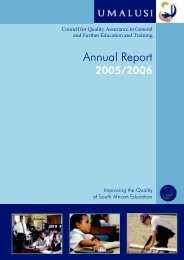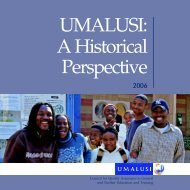Inspecting the Foundations - Umalusi
Inspecting the Foundations - Umalusi
Inspecting the Foundations - Umalusi
Create successful ePaper yourself
Turn your PDF publications into a flip-book with our unique Google optimized e-Paper software.
describe Public Adult Learning Centres (PALCs) as ‘predominantly dysfunctional institutions with fewor no administrative and management systems’, and go on to argue that ‘<strong>the</strong> instability of <strong>the</strong>seinstitutions is compounded by high attrition rates, deterrents to participation, and a high turnoverin educators’. Walters (2006) argues that <strong>the</strong>re has been limited progress in terms of increase ofdelivery, aggravated by a loss of capacity within community-based organizations. O<strong>the</strong>r providersof alternative forms of adult education include <strong>the</strong> Departments of Labour, Correctional Services,Health, and Water Affairs, and Walters (2006) argues that a range of adult learning activities indifferent areas of life refl ects a wide range of vibrant activities. Walters concedes that this broadnotion of learning is diffi cult to evaluate, as <strong>the</strong> programmes and activities are diverse and hard todelineate.Much adult education in South Africa prior to <strong>the</strong> democratic elections in 1994 was informedby <strong>the</strong> radical idea that adult education was critical to social change: it aimed to address andchange ‘<strong>the</strong> socio-economic and political system that produces and perpetuates conditions ofinequality’ (Baatjes and Ma<strong>the</strong> 2004, p. 393). Adult education in this tradition is ‘not just a processof imparting and acquiring knowledge … but is a political process of raising critical awareness ofinjustice’ (Ibid.). This approach, <strong>the</strong>y argue, was prominent in non-governmental organizationsand among activists in higher education. This type of provision was non-formal, ‘revolutionary,and inclusive’ (Ibid.) and <strong>the</strong>y argue that a tension exists between this type of adult educationand what <strong>the</strong>y identify as ‘instrumentalist’ adult education (Baatjes and Ma<strong>the</strong> 2004, p. 394). Theinstrumentalist approach emphasizes <strong>the</strong> role of adult education in improving productivity andleading to employment opportunities for adults. This approach started to become prevalent withinbusiness and labour groupings involved in <strong>the</strong> reform of training policy in <strong>the</strong> early 1990s (in forumssuch as National Economic Development and Labour Council) around <strong>the</strong> time of <strong>the</strong> transition todemocracy. Baatjes and Ma<strong>the</strong> argue that instrumentalism continues to permeate governmenteducational policy, programmes, plans, and strategies today.With <strong>the</strong> advent of democracy in South Africa, <strong>the</strong> introduction of outcomes-based education,and <strong>the</strong> development of <strong>the</strong> NQF, <strong>the</strong> possibility emerged for adults to receive credit for learningalready achieved, and to access continued, quality-assured lifelong learning. It was generallythought that <strong>the</strong> unit standards and outcomes associated with this system would enable <strong>the</strong>progressive education that <strong>the</strong> adult education community needed – through enabling fl exibility,but at <strong>the</strong> same time ensuring formal recognition of learning. Recognition of prior learning and<strong>the</strong> accumulation and transfer of credits have not, however, made great inroads into improvingaccess. The new Quality Councils should ensure that this matter receives renewed attention.The Department of Education (DoE) attempted to create policies which would enable delivery ofadult basic education and training which is ‘fl exible, developmental and targeted at <strong>the</strong> specifi cneeds of particular audiences and (which) ideally, provides access to nationally recognizedcertifi cates’ (Department of Education (DoE) 1997).Between 1998 and 1999, qualifi cations and unit standards in eight sub-fi elds of <strong>the</strong> NQF weredeveloped and registered (Baatjes and Ma<strong>the</strong> 2004). In 2001, <strong>the</strong> fi rst certifi cation of adult learnerstook place, by <strong>the</strong> South African Certifi cation Council, <strong>the</strong> predecessor of <strong>Umalusi</strong>.In 2001, <strong>the</strong> Department of Labour launched <strong>the</strong> National Skills Development Strategy, which wasalso aimed at raising <strong>the</strong> basic educational levels of all workers, with a specifi c target that 70% ofworkers would have a GETC by <strong>the</strong> end of 2005 (Baatjes and Ma<strong>the</strong> 2004). As Baatjes and Ma<strong>the</strong>point out, this target was easily achievable without altering literacy rates, as employers simplychose to employ those already with a Senior Certifi cate.Baatjes and Ma<strong>the</strong> (2004), in line with Muller’s (2004) arguments about <strong>the</strong> school system and <strong>the</strong>NQF, discuss some challenges for <strong>the</strong> ‘centralization’ of adult education through <strong>the</strong> NQF. Theycite, amongst o<strong>the</strong>r factors, <strong>the</strong> institutionalization of adult education through <strong>the</strong> PALCs, <strong>the</strong>employment of school teachers on a part-time basis as adult educators, <strong>the</strong> development of aunit standards-based qualifi cation, <strong>the</strong> delivery of a national learning programme which consists9



